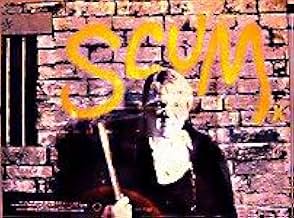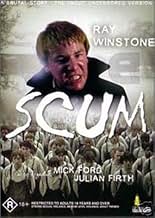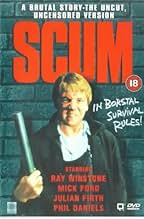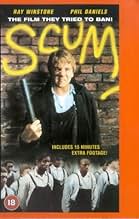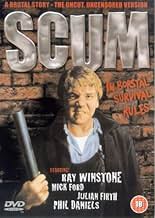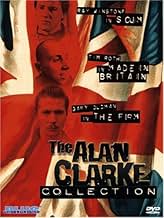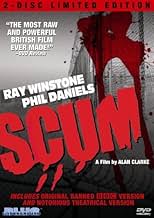VALUTAZIONE IMDb
7,5/10
13.976
LA TUA VALUTAZIONE
Una storia senza compromessi della vita in un istituto di delinquenza minorile britannico negli anni '70.Una storia senza compromessi della vita in un istituto di delinquenza minorile britannico negli anni '70.Una storia senza compromessi della vita in un istituto di delinquenza minorile britannico negli anni '70.
- Regia
- Sceneggiatura
- Star
Philip DaCosta
- Jackson
- (as Philip Da Costa)
Recensioni in evidenza
The grandaddy of 'incarceration' films - this is one of the best, oft copied but never bettered.
I liked it because it's so damn British. The one liners are legion; you all know what they are and where, but among a stellar list 'Mecca, Archer' rises just above and never fails to have me in fits. The way Goodyear looks at the Governor just after this great outburst is also revealing; as is the look of satisfaction on Archer's face when he finally succeeds in riling the 'religious maniac'.
Of course, there's a serious message in here; expedited best in the conversation between Archer and Mr Duke over 'coffee'. Analysing the situation, as Archer attempts to do, will simply not be tolerated and is interpreted as dissent by a man who embodies the 'system' and is intellectually and emotionally unequipped to deal with his own, and the State's ultimate failure to deliver.
Like true class acts, this film works on several levels; it's a no nonsense drama bedecked with Taj Mahal one liners everyone loves, yet it also works on a deeper level; you cannot punitively 'correct' all offenders with violence and cruelty. You are not corrected, you are merely broken, as Davis and Toyne are. If you're not broken, you run amok, but the point is you're not 'cured'.
When this film was on TV in 1983, just after Channel Four started broadcasting, they edited the notorious potting shed sequence to such an extent that the heinous act committed was virtually excised, thereby diluting the dramatic effect to virtually zero. Interestingly enough, they also edited out the bit where Mr Greaves ignores Davis' second press of the bell. Why? Presumably because they feared the ire of the State at the highlighting of its inadequacies? I suppose they can be forgiven, Channel Four was new then after all, but it's quite revealing nonetheless.
If I'm home alone, I quote this film as I'm wandering around the house. I don't quite know why. It's all about the importance of individuality, standing up for yourself and not just 'accepting' things. That's probably the reason. Now, where's your tool?
I liked it because it's so damn British. The one liners are legion; you all know what they are and where, but among a stellar list 'Mecca, Archer' rises just above and never fails to have me in fits. The way Goodyear looks at the Governor just after this great outburst is also revealing; as is the look of satisfaction on Archer's face when he finally succeeds in riling the 'religious maniac'.
Of course, there's a serious message in here; expedited best in the conversation between Archer and Mr Duke over 'coffee'. Analysing the situation, as Archer attempts to do, will simply not be tolerated and is interpreted as dissent by a man who embodies the 'system' and is intellectually and emotionally unequipped to deal with his own, and the State's ultimate failure to deliver.
Like true class acts, this film works on several levels; it's a no nonsense drama bedecked with Taj Mahal one liners everyone loves, yet it also works on a deeper level; you cannot punitively 'correct' all offenders with violence and cruelty. You are not corrected, you are merely broken, as Davis and Toyne are. If you're not broken, you run amok, but the point is you're not 'cured'.
When this film was on TV in 1983, just after Channel Four started broadcasting, they edited the notorious potting shed sequence to such an extent that the heinous act committed was virtually excised, thereby diluting the dramatic effect to virtually zero. Interestingly enough, they also edited out the bit where Mr Greaves ignores Davis' second press of the bell. Why? Presumably because they feared the ire of the State at the highlighting of its inadequacies? I suppose they can be forgiven, Channel Four was new then after all, but it's quite revealing nonetheless.
If I'm home alone, I quote this film as I'm wandering around the house. I don't quite know why. It's all about the importance of individuality, standing up for yourself and not just 'accepting' things. That's probably the reason. Now, where's your tool?
Scum is an unforgiving portrayal of both physical and psychological abuse of the British borstal system; 1 hour and 30 minutes. The movie explores the borstal's hierarchy, analyzing both the wardens and the inmates ' actions and responsibilities, asking who is the worst. As Carlin (Ray Winstone) joins the borstal, the hierarchy is shattered. Carlin says he's looking for' no trouble,' but he's just as pugnacious or even more skullduggerous than the others. Scum describes the angry resentment of inequality in' correctional' institutions, much like' Cool Hand Luke' or' One Flew Over The Cuckoo's Nest.' Personally, I find few things worse than power abuse, whether in an institution or in a family. I'm sure that many would agree with me on that, and then make Scum an engrossing, resonant, and uncomfortable watch for everyone. Archer's protagonist, an articulate and apparently committed vegetarian who's out to make life difficult for the screws, delivers fragments of Roy Minton's script that beautifully examine the process and the angry men who staff these institutions-" Even though you've spent your life in jail, you're still just a simple cop. Now, who's got the stick for that? Us. Who's paying for that every day. Scum achieves what it aims to accomplish through convincing performance and blunt realism: portraying the reprehensible conditions of terrorism, discrimination and bribery in these institutions. One might wonder if the movie exaggerated these circumstances, but in 1982 government abolished the borstal scheme, replacing it with' Youth Custody Centres.' I assume it speaks volumes for the reputation of Scum.
Be warned that you should go into this film with your guard up. By the time the final scene has faded quietly out, you will probably be in a state of shock.
The film details life in a Borstal institution and the violence and racial hatred that runs rampant through both the prisoners and their wardens. There is nothing cheery here at all and that is precisely the point. Director Alan Clarke deliberately films with a documentary style and it is this realism that makes the film so shattering. Scenes of sexual and racial abuse are placed in front of the camera and no raw nerve is spared the touch of the film.
It should be shown to youngsters as a reason not to turn to crime.
The film details life in a Borstal institution and the violence and racial hatred that runs rampant through both the prisoners and their wardens. There is nothing cheery here at all and that is precisely the point. Director Alan Clarke deliberately films with a documentary style and it is this realism that makes the film so shattering. Scenes of sexual and racial abuse are placed in front of the camera and no raw nerve is spared the touch of the film.
It should be shown to youngsters as a reason not to turn to crime.
The story on which Scum is based was originally penned to be a part of a BBC series 'Play For Today' but was not shown at the time. It was made into a film two years later by Alan Clarke; and the reason it was not shown earlier is clear to see; as Scum is a shocking and unflinching account of life in Britain's now defunct Borstal system. The film is gritty and realistic and features no shortage of violence, so it's hardly a surprise that it didn't go down particularly well with Britain's conservative film censors. The film revolves around a young offender's institution in Britain. The place is shook up upon the arrival of a young man named Carlin. Carlin was moved from another institution for fighting with a guard, and arrives with his reputation already in front of him. He soon finds out how the prison works and quickly seeks to take out "the daddy" and his cronies to take control of the place himself.
Ray Winstone would go on to have a good career playing hard man types; and this is where it all started. The actor has a much younger look about him than the grizzled actor many will know better; but he still fits the bill well here and is always believable in his role. The film also features a number of faces that will be familiar to anyone who knows anything about British TV. Scum doesn't just rely on violence to deliver its shocks; the whole atmosphere of the central location is thoroughly grim and the guards' attitude towards the inmates does not inspire confidence in the system that the film is portraying. The film does not generally directly expose the flaws of the prison system; although this is given some attention by way of Mick Ford's Archer character; that cleverly condemns the system through dialogue. The story runs smoothly for the first two thirds of the film, while the final third is dedicated to the film's most shocking scenario; a sequence of events that is most likely, from anything in the film, to stay with the viewer once the film is over. Overall, this is an excellent little film that deserves to be viewed by anyone that considers themselves a fan of wayward cinema.
Ray Winstone would go on to have a good career playing hard man types; and this is where it all started. The actor has a much younger look about him than the grizzled actor many will know better; but he still fits the bill well here and is always believable in his role. The film also features a number of faces that will be familiar to anyone who knows anything about British TV. Scum doesn't just rely on violence to deliver its shocks; the whole atmosphere of the central location is thoroughly grim and the guards' attitude towards the inmates does not inspire confidence in the system that the film is portraying. The film does not generally directly expose the flaws of the prison system; although this is given some attention by way of Mick Ford's Archer character; that cleverly condemns the system through dialogue. The story runs smoothly for the first two thirds of the film, while the final third is dedicated to the film's most shocking scenario; a sequence of events that is most likely, from anything in the film, to stay with the viewer once the film is over. Overall, this is an excellent little film that deserves to be viewed by anyone that considers themselves a fan of wayward cinema.
I'd had the opportunity to watch Scum a long time before I actually did, and I was always turned off it by the very sensationalist box and taglines. I've never been a fan of "The film they tried to ban" and similar phrases being used as advertisement for a film, so when I sat down to watch the film today I was very surprised.
It doesn't need phrases like that to advertise it - it's bleak and horrific, and should be advertised as a serious drama rather than some kind of exciting gore-fest. As well as being powerful and thought provoking, it's gripping too, and you won't feel bored when watching it. Although there is a lot of stuff crammed in there, and some scenes are very prolonged, at just over and hour and a half it's the perfect length to achieve what it sets out to do. This is one film you won't be bored watching.
I'm actually surprised that this film doesn't have more of a recognition or following nowadays, and isn't seen in the last light as Kubrick's "A Clockwork Orange" and Lindsay Anderson's "If...".
It doesn't need phrases like that to advertise it - it's bleak and horrific, and should be advertised as a serious drama rather than some kind of exciting gore-fest. As well as being powerful and thought provoking, it's gripping too, and you won't feel bored when watching it. Although there is a lot of stuff crammed in there, and some scenes are very prolonged, at just over and hour and a half it's the perfect length to achieve what it sets out to do. This is one film you won't be bored watching.
I'm actually surprised that this film doesn't have more of a recognition or following nowadays, and isn't seen in the last light as Kubrick's "A Clockwork Orange" and Lindsay Anderson's "If...".
Lo sapevi?
- QuizCarlin was originally a Glaswegian, but was changed into a Cockney when Alan Clarke saw a then-unknown Ray Winstone walk in a unique way.
- BlooperAll borstal inmates were subject to the same mandatory short-back-and-sides haircut, yet a vast array of hairstyles are shown throughout the film, including afros.
- Versioni alternativeNorwegian cinema version was cut in the rape scene and the suicide scene. Later video versions are uncut.
- ConnessioniFeatured in The South Bank Show: Keith Jarrett/Scum (1979)
- Colonne sonoreDirty Last Night
(uncredited)
Music by John Dickson and Elfed Hayes
De Wolfe Music Ltd
I più visti
Accedi per valutare e creare un elenco di titoli salvati per ottenere consigli personalizzati
- How long is Scum?Powered by Alexa
Dettagli
- Data di uscita
- Paese di origine
- Sito ufficiale
- Lingua
- Celebre anche come
- Scum más allá de la degradación
- Luoghi delle riprese
- Aziende produttrici
- Vedi altri crediti dell’azienda su IMDbPro
Botteghino
- Budget
- 250.000 £ (previsto)
- Lordo Stati Uniti e Canada
- 6461 USD
- Fine settimana di apertura Stati Uniti e Canada
- 1948 USD
- 18 giu 2017
- Lordo in tutto il mondo
- 6461 USD
- Tempo di esecuzione
- 1h 38min(98 min)
- Mix di suoni
- Proporzioni
- 1.66 : 1
Contribuisci a questa pagina
Suggerisci una modifica o aggiungi i contenuti mancanti


